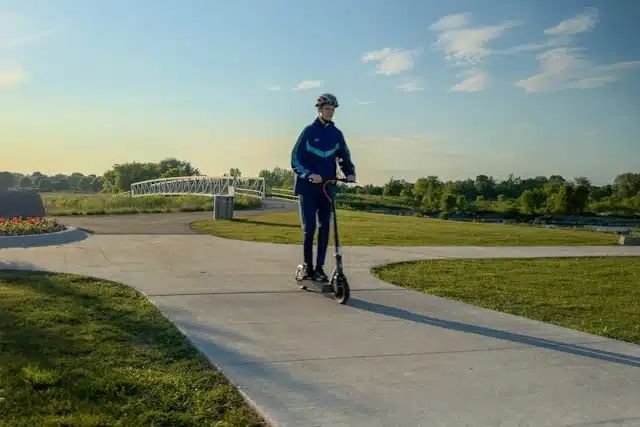- in Canada
E-scooters have become a popular way to get around Ottawa, offering a convenient and eco-friendly option for short trips. But like any vehicle, e-scooters come with specific legal responsibilities and potential liability risks that every rider should know about.
Ottawa's E-Scooter Rules and Regulations

The City of Ottawa has put clear rules in place to make e-scooter use safer for everyone:
- Age Requirement: Riders must be 16 years of age or older.
- Helmet Use: Mandatory for riders under 18; strongly recommended for all.
- Where to Ride: E-scooters are allowed on streets with speed limits of 50 km/h or less, bike lanes, cycle tracks, and multi-use pathways. Riding on sidewalks is prohibited, with a potential $150 fine for violations.
- Riding Conduct: Riders must stand while operating, cannot carry passengers or cargo, and must not ride under the influence of alcohol or drugs.
These rules help prevent accidents and minimize liability, but riders still face potential legal issues if accidents occur.
Liability in E-Scooter Accidents

If you're riding an e-scooter, here's what you should know about liability:
- Accidents with Pedestrians: If a rider collides with a pedestrian, they could be held liable for any injuries or damages, especially if found to have violated any safety rules.
- Collisions with Vehicles: In accidents with motor vehicles, liability can be complicated. Following all traffic regulations and riding safely are crucial to avoid being held responsible for any collision.
- Property Damage: Riders are financially liable for any damage they cause to public or private property while operating an e-scooter.
Insurance Coverage and Statutory Accident Benefits
Unlike motor vehicles, e-scooters are not required to carry insurance in Ontario. However, riders should consider how they would handle costs in the event of an accident:
- Personal Liability: Without specific e-scooter insurance, riders are personally liable for any damages or injuries they cause to others.
- Home Insurance: Some homeowners or tenants insurance policies might provide limited coverage for personal liability with e-scooters, but this varies significantly. It's best to review your policy or talk to your insurance provider.
In cases where an e-scooter rider is injured in an accident, statutory accident benefits generally do not apply—unless the accident involves a motor vehicle. E-scooters are generally not classified as motor vehicles in Ontario, so riders injured in non-vehicular incidents (like falls or collisions with pedestrians) do not qualify for these benefits. However, if a motor vehicle is involved, the injured rider may claim statutory accident benefits through their own auto insurance or, if they don't have insurance, through the policy of the involved motor vehicle.
Safety Tips for Ottawa's E-Scooter Riders

To minimize risk:
- Wear Protective Gear: Helmets and additional protective gear can reduce injury risk.
- Follow All Laws: Obeying traffic signals, avoiding sidewalks, and riding sober are essential to staying safe and avoiding fines.
- Be Alert: Pay attention to your surroundings, including vehicles, pedestrians, and road conditions.
Final Thoughts
While e-scooters are a convenient travel option, Ottawa riders need to understand the liability risks and legal responsibilities involved. By following local regulations, considering insurance options, and riding safely, riders can better protect themselves and others on the road.
The content of this article is intended to provide a general guide to the subject matter. Specialist advice should be sought about your specific circumstances.


